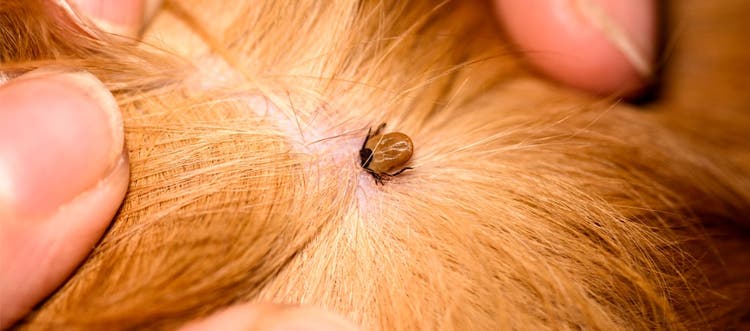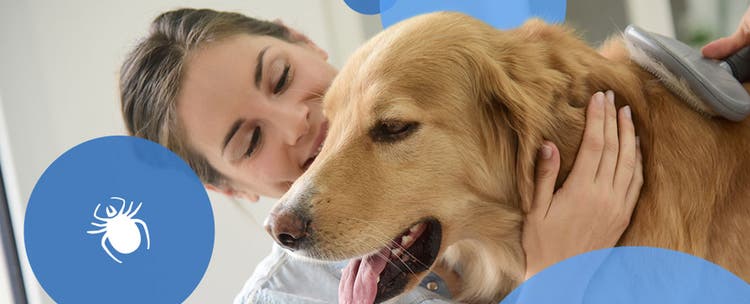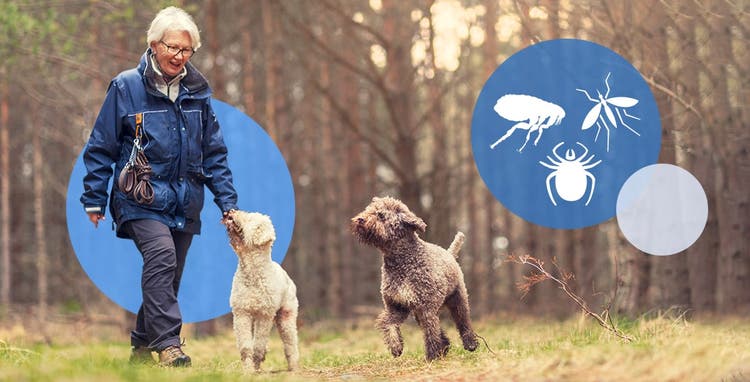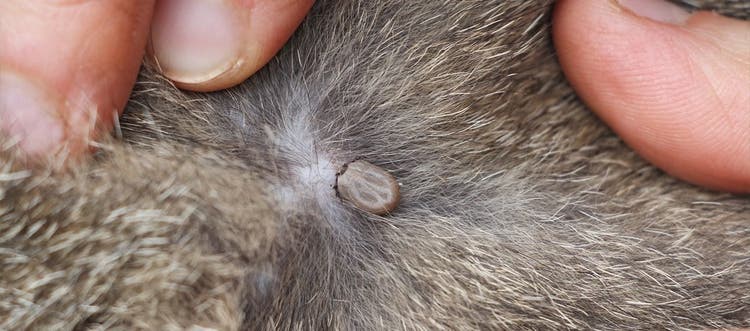Ticks can carry diseases that harm pets and humans.
Tick bites can be irritating for dogs, but the bigger concern is the diseases ticks can transmit to dogs and humans alike. While your dog can’t transmit a tick disease directly to you, you both could be at risk for tick bites when you spend time outdoors. Read on to learn how tick-borne diseases can affect both dogs and people.
The Risks of Ticks to Dogs — and Humans
Tick disease symptoms in dogs and people vary depending on the specific disease. Some common tick-borne diseases include:
Lyme Disease
Lyme disease is a bacterial infection spread through the bite of an infected tick. Dogs with Lyme disease may show the following signs:
- Loss of appetite
- Tiredness
- Painful joints
- Swollen lymph nodes
Humans are also at risk of Lyme disease, and symptoms include:
- A distinctive bull’s-eye rash 12 or more inches wide around the bite
- Tiredness
- Muscle and joint pain
- Neck pain Headaches
Left untreated, the disease can lead to serious problems, including paralysis and meningitis, a potentially fatal swelling of the membranes around the brain and spinal cord.
Rocky Mountain Spotted Fever
Rocky Mountain spotted fever (RMSF) is a bacterial infection that affects both dogs and humans and can become serious, or even fatal, if not properly identified and treated. Dogs with RMSF may display symptoms like:
- Poor appetite
- Muscle or joint pain
- Fever
- Swelling of the face or legs
Signs of RMSF in humans include:
- Vomiting and nausea
- Sudden high fever
- Severe headache
- Abdominal pain and muscle aches
- A splotchy red rash or pinpoint dots that appear two to four days after the start of a fever
If you suspect an infection, see a medical professional or veterinarian as soon as possible to receive antibiotic treatment for you or your pet.
Ehrlichiosis
Ehrlichiosis, a tick-borne infection in dogs that affects the white blood cells, is most commonly found in the southeastern and southern United States. Symptoms vary and can include:
- Fever
- Weight loss
- Discharge from the eyes and nose
- Swollen lymph nodes
Humans can also contract ehrlichiosis, with signs and symptoms like:
- Fever and chills
- Headache
- Muscle pain
- Vomiting
Babesiosis
Ticks can also transmit babesiosis, a disease that can be fatal in dogs. This parasite invades the dog’s red blood cells, causing severe anemia. Symptoms of babesiosis in dogs include:
- Weakness
- Lethargy
- Pale gums
- Dark urine
- Yellowing skin
- Fever
Humans with babesiosis may feel fine and show no symptoms at all; however, the disease can be life-threatening for people with certain risk factors like advanced age and impaired immune function.
Checking for Ticks on Your Dog
The longer a tick remains on your dog after biting them, the more likely your dog is to contract a disease. Therefore, you should regularly check your dog for ticks, especially during your region’s peak tick season, and quickly remove any ticks you find. Focus on the areas where ticks tend to bite dogs, such as on the head and neck, around the ears and in between your dog’s paws. However, ticks can be found anywhere on a dog’s body — even inside the ears.
When to Contact the Vet about Tick-borne Diseases in Your Dog
If you think your pet is suffering from a tick-borne disease, it’s important to see your veterinarian. They can run blood work and determine if you pet is in need of treatment. Treatment may vary based on clinical signs and your dog’s recent history.
Ticks are dangerous because they carry diseases and are often not as visible on dogs as they are on humans. Because of this, the best way to help protect them from biting ticks in the first place is to use a tick prevention product that repels and/or kills disease-carrying ticks. There are a number of tick products on the market, including spot-on treatments, tablets and medicated collars. Consider a tick product that repels, as a tick that is repelled cannot bite and transmit disease.

Seresto® Flea & Tick Collar for Dogs
An easy-to-use, odorless, non-greasy collar that kills and repels fleas and ticks for 8 continuous months.

K9 Advantix® II
A convenient, monthly topical application that kills and repels fleas and ticks through contact, so they don't have to bite your dog to die. Do not use on cats.






